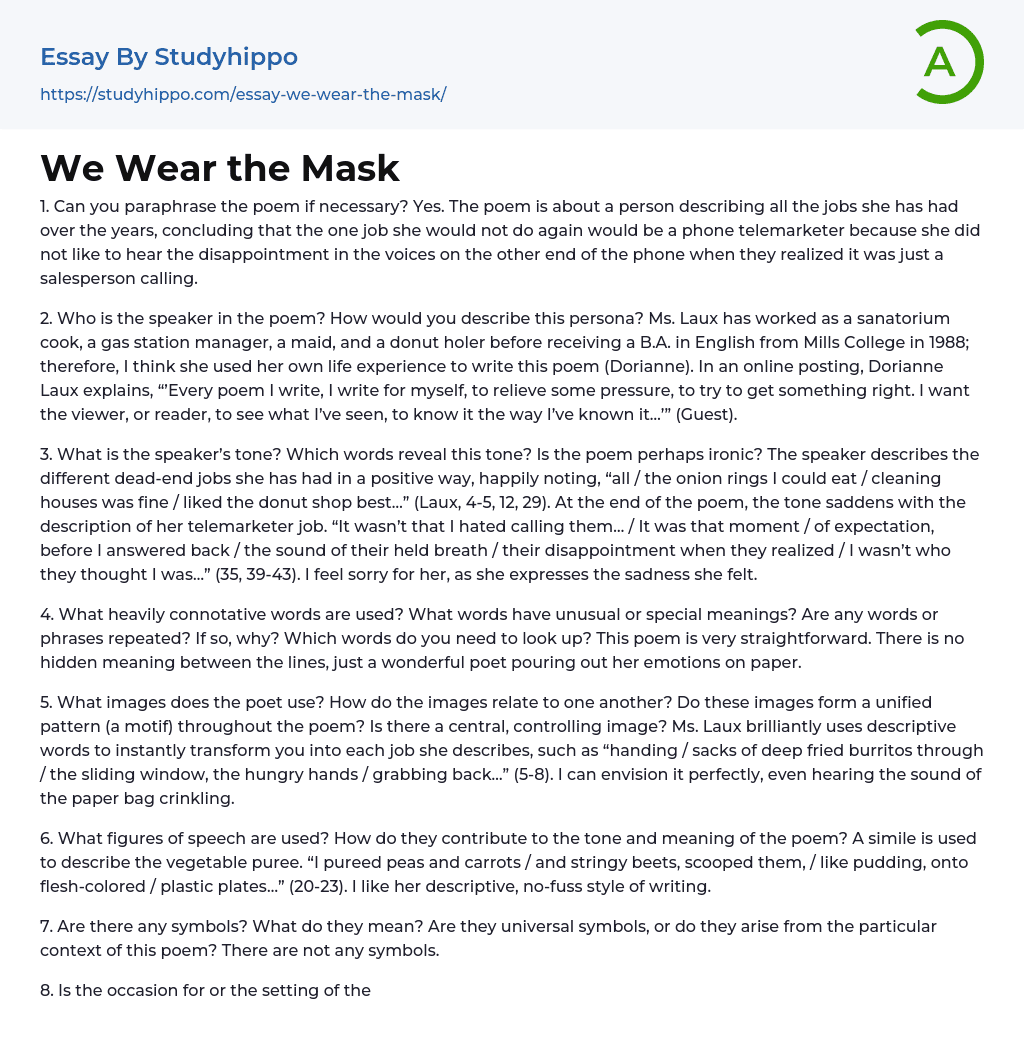Can the poem beif necessary? Yes, it can. The poem depicts an individual reflecting on their various past occupations and asserts that the one job they would not repeat is being a telemarketer due to the discomfort caused by disappointing the people on the receiving end of their calls.
Who is the speaker in the poem, and how would you characterize them? The speaker, Ms. Laux, has had various job roles such as a sanatorium cook, gas station manager, maid, and donut holer before completing a B.A degree.
Dorianne Laux obtained a degree in English from Mills College in 1988, implying that she drew inspiration from her personal life when writing this specific poem (Dorianne). In an online statement, Dorianne Laux clarifies that each poem she writes serves as a form of personal release and an attempt to accurately convey her ex
...periences. She hopes that the audience, or reader, can perceive and understand her perspective (Guest). 3.
The tone of the speaker can be described as initially positive and then saddening. The words that reveal this tone include "happily" when describing the different jobs she had and "sadness" when expressing her feelings. The poem may also have a hint of irony as the speaker describes the dead-end jobs in a positive way. The speaker mentions enjoying cleaning houses and liking the donut shop job. However, the tone changes towards the end of the poem when describing her telemarketer job. The speaker expresses sadness and describes the disappointment felt by others when they realized she wasn't who they expected. Overall, there is a sense of sympathy towards the speaker and the sadness she experienced in her jobs.
4.
The text asks about the presence of heavily connotative words, unusual meanings of words, repetition of words or phrases, and the need to look up certain words. It states that this poem is straightforward and lacks hidden meaning, but serves as a heartfelt expression of emotions by the poet.
5. The text inquires about the images used by the poet, their relation to each other, and if they form a unified pattern or motif throughout the poem. It also questions if there is a central controlling image. Ms. Laux effectively employs descriptive language to vividly transport readers into each job she describes, like "handing / sacks of deep fried burritos through / the sliding window, the hungry hands / grabbing back..." (5-8).
The speaker has a clear mental image and can even hear the sound of a paper bag crinkling. The poem uses a simile to describe the vegetable puree, comparing it to pudding being scooped onto plastic plates.
I appreciate her straightforward and detailed writing style. The poem does not have any symbols and the setting is important in understanding its meaning.
If so, why? The speaker detailed her experience working in various professions: fast food, as a maid, at a sanatorium, as a gas station attendant, in a donut shop, and lastly as a telemarketer. Among all these job roles, one might assume that the telemarketer job would be her favorite, given its office setting. However, towards the end of the poem, the speaker unveils the sadness that consumed her when the voice on the other end of the phone realized she was just another salesperson calling. She'd rather clean toilets than endure the feeling of
being unwanted. To effectively convey her emotions to the reader, she found it necessary to recount her past experiences.
The central idea of this poem is that one should find a job that brings them happiness. The role of metrics, such as rhyme and rhythm, is important in this poem. It is written in open form (free verse) and does not rhyme, but rhythm does play a part. Laux also uses commas before some words at the end of a line to emphasize them.
"The only job I didn't like, quit..." (1). "Before that it was fast food, all..." (4). 11. How important is the contribution of form, such as rhyme scheme and line arrangement? How does the form influence the overall effect of the poem? There is not a certain form followed in this poem. In an online posting, Dorianne Laux comments, "'I am compelled by poets who tell stories and find ways to make the telling sing. When I begin to write, the music seeped into the words and I found myself playing language like an instrument'" (Guest).
- Culture essays
- Social Control essays
- Citizenship essays
- Social Justice essays
- Caste System essays
- Social Responsibility essays
- Socialization essays
- Deviance essays
- Modern Society essays
- Popularity essays
- Civil Society essays
- Community essays
- Female essays
- Filipino People essays
- Igbo People essays
- Indigenous Australians essays
- Indigenous Peoples essays
- Minority Group essays
- Social Institution essays
- Men essays
- The nation essays
- Middle Class essays
- Social Norms essays
- Discourse Community essays
- Popular Culture essays
- Car Culture essays
- American Culture essays
- Mormon essays
- Indian Culture essays
- Mexican Culture essays
- Pop Culture essays
- Cultural Differences essays
- Culture Shock essays
- Different Cultures essays
- Profession essays
- Labour Economics essays
- Occupational Safety And Health essays
- Pension essays
- Salary essays
- Strike Action essays
- Wage essays
- Career essays
- Workplace essays
- Homeless essays
- Working Together essays
- Career Path essays
- Hunter essays
- Farmer essays
- Nurse essays
- Pilot essays




